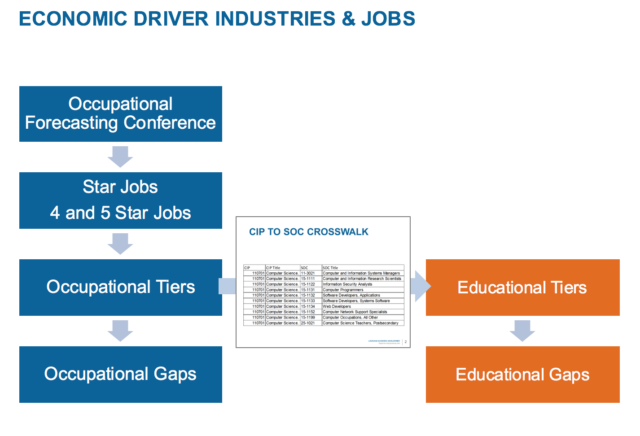
Approximately 53% of open jobs in 2020 in Louisiana required a career credential or college degree according to the Georgetown University Center on Education and Workforce. It will take a comprehensive approach to address the challenges the State faces in meeting this expectation. Filling these college-trained jobs will prove challenging to Louisiana’s under-educated adult population.
According to the National Center for Higher Education Management (NCHEMS), Louisiana ranks 49th in educational attainment with only 30.7% of working-aged residents, 25-64 years, earning an associate’s degree or higher. In order to reach the average educational attainment rate for Southern states, Louisiana will need to increase the percentage of adults with some college from 30.7% to 42.0% by 2025, or an increase of 182,495 credentials.*
The Lumina Foundation maintains that other postsecondary credentials — including certificates and certifications — should count toward national and state goals for attainment, with one important caveat: they should be of high quality, defined as having clear and transparent learning outcomes leading to further education and employment. A 2016 Lumina study estimates that Louisiana’s postsecondary attainment was 44.7%, including high-quality certifications. Lumina acknowledges that Louisiana’s estimated certificate-attainment percentage may be overstated and needs further refinement. Louisiana looks forward to future work by Lumina in this regard. Overall, whether NCHEMS or Lumina estimates are used, the State’s educational attainment projections still fall short of reaching the recommended rate by 2025 of producing sufficient individuals to fill the openings of good jobs in Louisiana.
Essentially, 15% of good jobs (high demand and well paying) that will become available each year will require no formal education beyond a high school diploma or equivalency. Slightly more than half of the good jobs across Louisiana today and those that will become available each year require a community or technical college degree or other credential. Slightly more than 30% of good jobs in Louisiana require a bachelor’s degree or higher. Postsecondary education must provide a highly skilled and well-trained workforce for Louisiana’s existing businesses and equip the State with the human capital needed to attract new businesses and industries. Secondary and postsecondary education leaders must partner to strengthen the connections between the senior year of high school and the freshman year of college.
Postsecondary leaders must advance strategies that minimize college seat-time to degree completion, and there must be an expectation that collaborative postsecondary education and business and industry public/private partnership efforts are necessary. A quality postsecondary education experience should be available, accessible, and affordable to all the citizens of the State, from the recent high school graduate to the adult returning to receive training or a credential.
*Source: National Center for Higher Education Management Systems (NCHEMS)
Higher Education = Hire Education
Increasing degree and certificate production in high-demand fields at all levels and narrowing the workforce gaps that stifle the State’s economic viability are shared goals of many agencies and entities throughout state government. For postsecondary education, guiding students into programs that will lead to productive employment is one focus, and partnering closely with business and industry to more appropriately align career and college programs to create seamless transitions is another.
As students navigate the higher education landscape, more and more students are choosing majors and seeking career guidance around the topic that their higher education experience will lead to Hire Education. According to Money magazine, 85% of 141,000 incoming freshmen polled at 200 universities said: “Getting a better job was a major reason for going to college, and six in 10 considered a college’s ability to help its graduates get good jobs when deciding where to attend.” As a result of this growing trend, Higher Education has to become increasingly more committed to also being Hire Education.
To assess workforce supply, the Board of Regents maintains data on enrollments and completers in programs across the postsecondary system and has developed metrics summarizing employment outcomes through data-sharing agreements with the LWC. LCTCS maintains data on enrollments and completers in credentials below the certificate level over which it has jurisdiction and has developed metrics summarizing employment outcomes for those completers through data-sharing agreements with the LWC. As with the Lumina Foundation, the Board of Regents recognizes the importance of certificates of value (short-term certificates in high demand by Louisiana’s employers) offered by the State’s community and technical colleges.
The key is that Louisiana’s educational attainment rate and workforce preparation at every level must increase for the state to be competitive.
CIP – SOC Initiative
The State’s occupational forecast projects short- and long-term employer demand for detailed occupations at the regional level. The improvements made to the occupational forecast over the last seven years have generated strong interest in using the forecast as a planning tool for education and training providers. However, the lack of a definitive guide linking instructional programs to occupations limits the ability to develop systematic benchmarks from the employment forecast.
The solution to these problems is in the development of a crosswalk between instructional programs and occupations. Instructional programs are tracked using the Classification of Instructional Programs (CIP) and occupations are tracked utilizing the Standard Occupational Classification (SOC) System, and the connection is commonly called a CIP-SOC crosswalk. The National Center for Education Statistics (NCES) publishes a CIP-SOC crosswalk, but it has limitations that prevent it from being actionable for policy planning purposes. Work is needed to develop a Louisiana-specific CIPSOC crosswalk with a data-driven link between programs and occupations accounting for the likelihood of an easy job match.
The State CIP-SOC Workgroup, comprised of representatives from the four Systems (LCTCS, LSU, SU, and ULS), Louisiana Economic Development, Louisiana Workforce Commission and the Board of Regents meet jointly to advance this initiative and create a Louisiana-specific CIP-SOC Crosswalk to aid in addressing the state’s workforce gap.
Classification of Instructional Programs (CIP) and the Standard Occupational Classification (SOC) Flowchart

Source: Louisiana Economic Development
Partnerships and Collaborations
Louisiana’s system of Workforce Development encompasses the entire spectrum of education from skills training and certification to relevant cutting-edge research, innovation, and commercialization to align educational attainment to current and future jobs in areas of highest priority for Louisiana. According to NCHEMS, nationally, Louisiana ranks 49th in educational attainment with only 30.7% of residents aged 25-64 years earning an associate’s degree or higher. To reach the average educational attainment rate for Southern states, Louisiana will need to increase the percentage of adults with some college from 30.7% to 42.0% by 2025, or an increase of 182,495 credentials.
It will take an “all hands on deck” approach to address the challenges that our state faces and meet the 2020 goal that Georgetown University Center on Education and the Workforce advances for Louisiana: By 2020, 65% of jobs in the United States and 56% of jobs in Louisiana will require postsecondary education.
Louisiana Workforce Agencies are partnering to address the educational attainment and workforce needs of our state and its citizens. The Workforce Cabinet partners include The Board of Regents, LCTCS, Louisiana Department of Education, Louisiana Economic Development/LED FastStart (LED), and the Louisiana Workforce Commission.
Work-Based Learning Initiative
One of the primary reasons students go to college is to increase their chances of getting a good job. However, it takes college graduates an average of three to six months to secure meaningful employment after earning a degree; and for early exiters without a credential, the time to obtain a job with a livable wage could be longer.
A solid career-seeking strategy and early exposure to work-based learning (WBL) opportunities are key components to making the school to work transition successful. Work-based learning has been referred to as “test driving a career. These work-based experiences can take on different forms, including internships, co-ops, pre-apprenticeships, and registered apprenticeships.
WBL experiences can assist with narrowing career options, provide opportunities to network with potential employers, assist a struggling student decide on a major, or help to hone job skills directly relevant to future employment. WBL provides an outlet to gain early exposure to employment, allowing students to “earn while you learn.” Work-based learning programs currently exist through programs like JumpStart, On-the-Job-training, externships, LOSFA field outreach services, and WorkReady U.
The Board of Regents invites Partners in Education to join us by becoming a Work-Based Learning site in Louisiana.
Please complete the form below and our staff will follow-up with you.
-
Work-Based Learning Initiative Form
Workforce Contact Us Form
